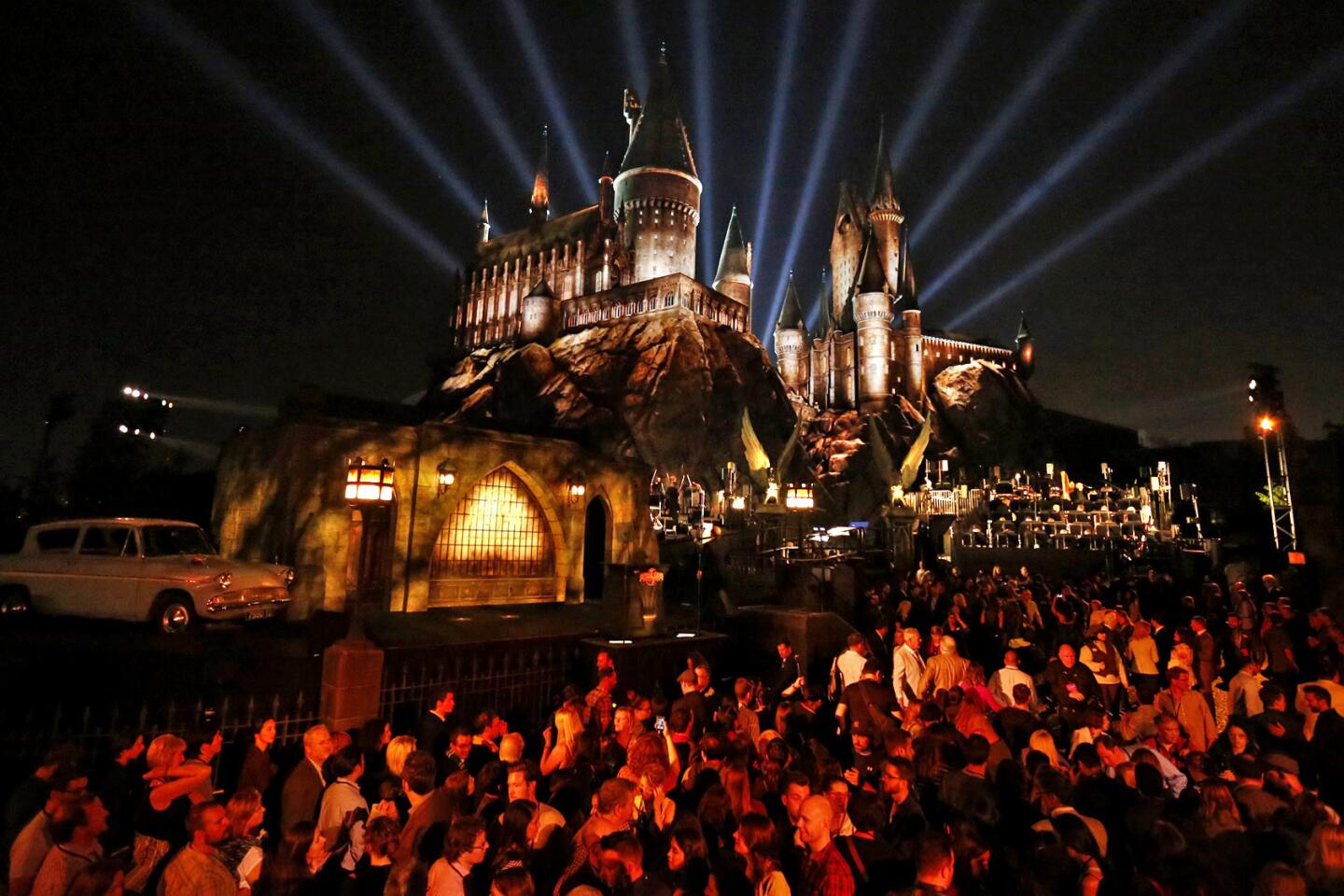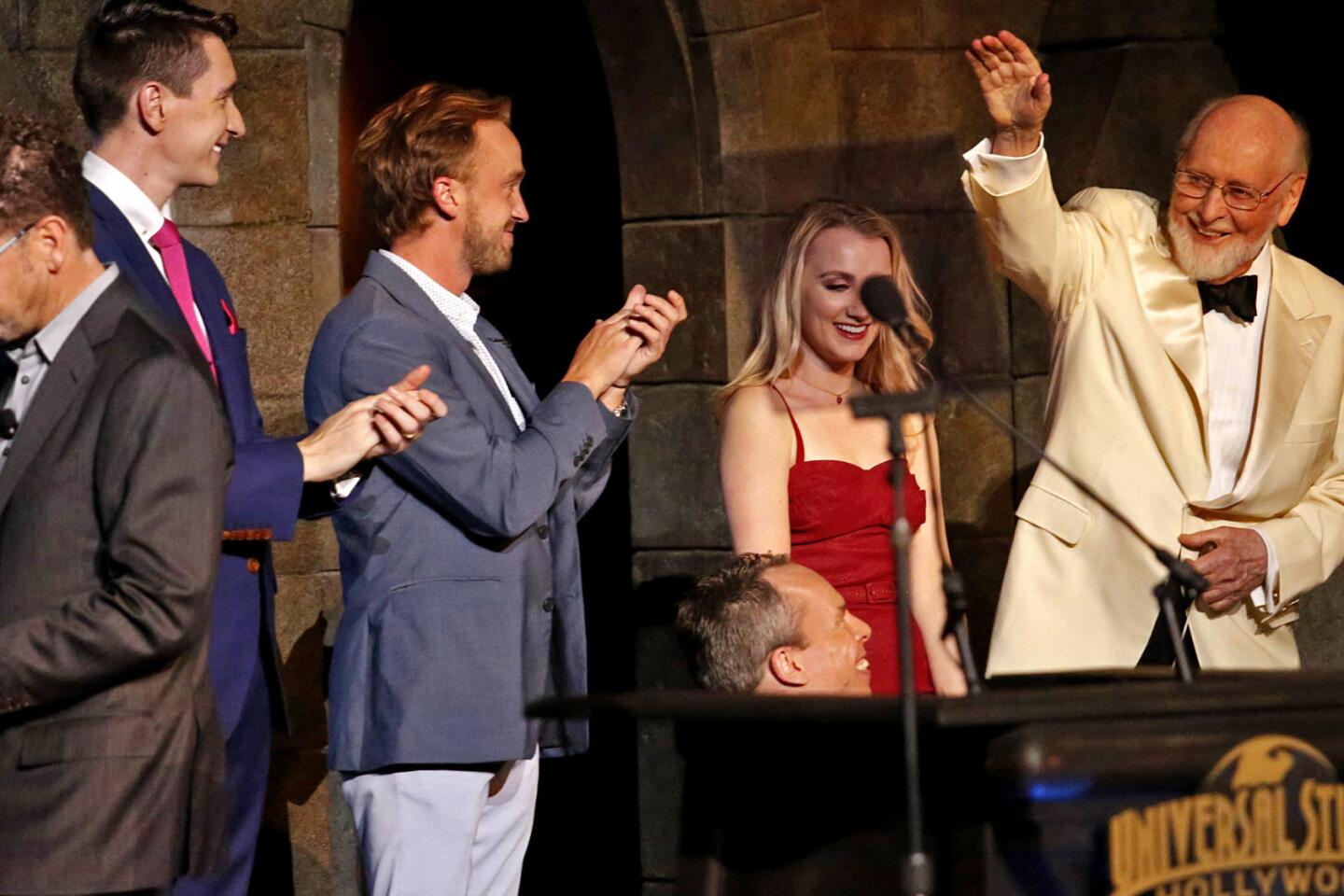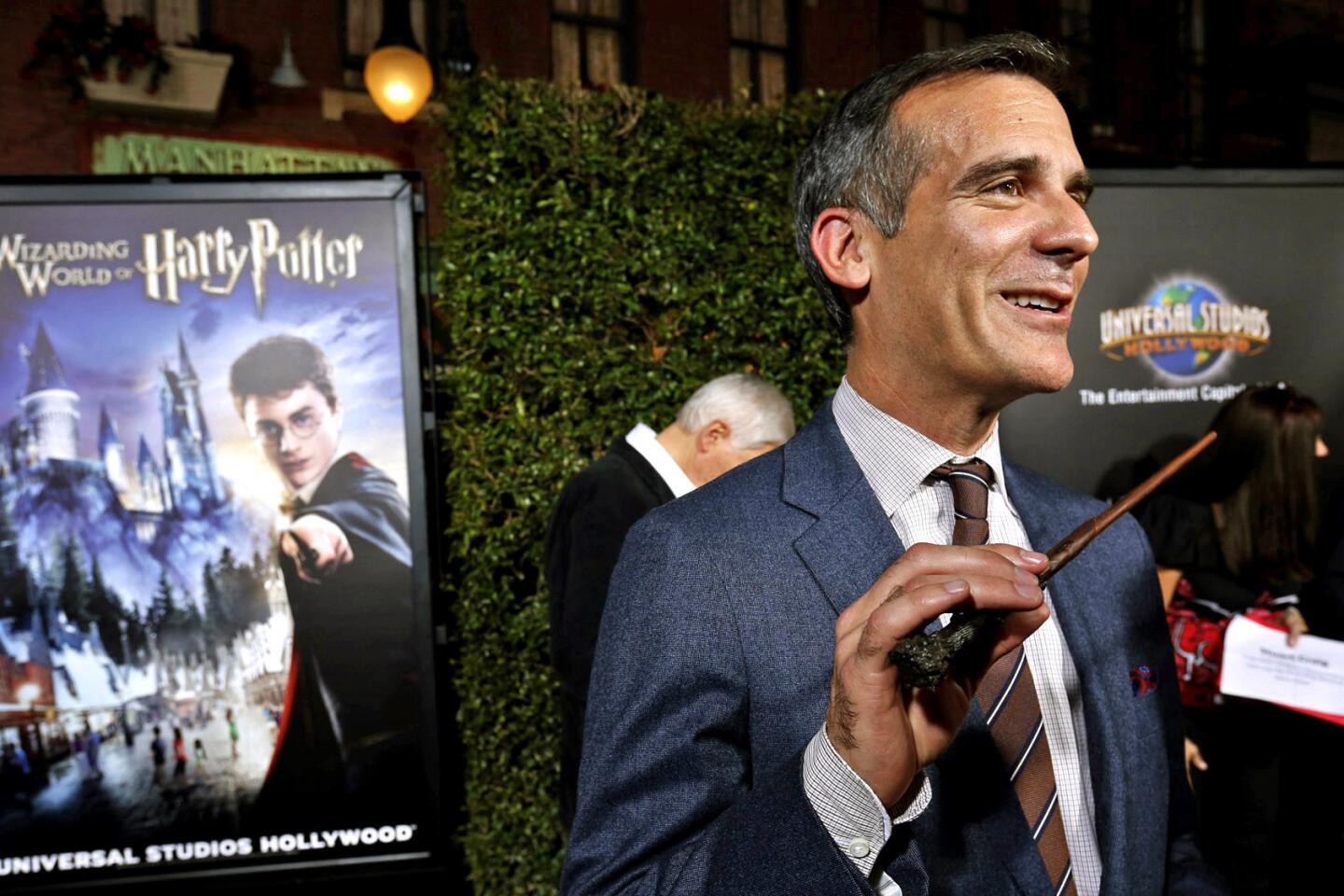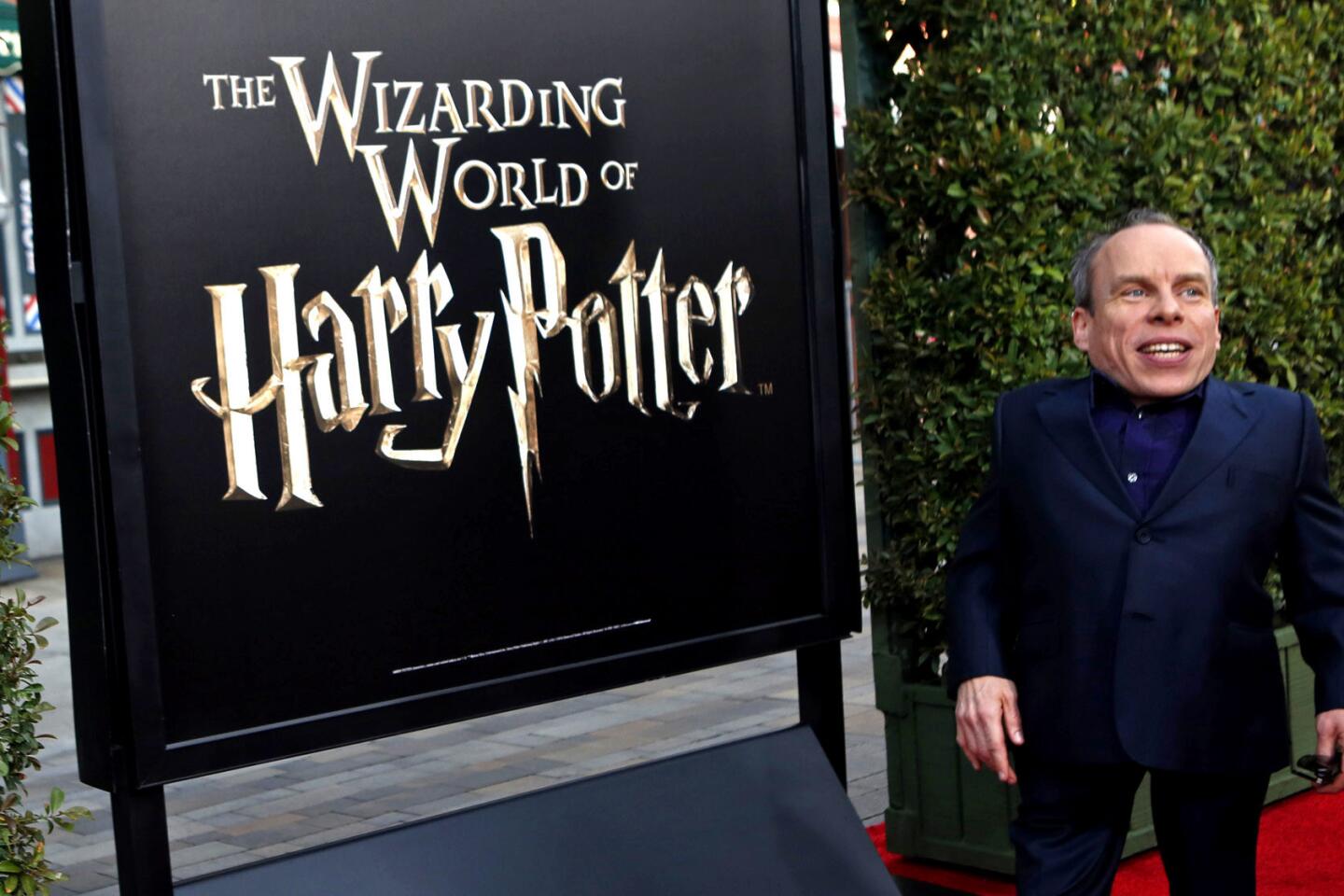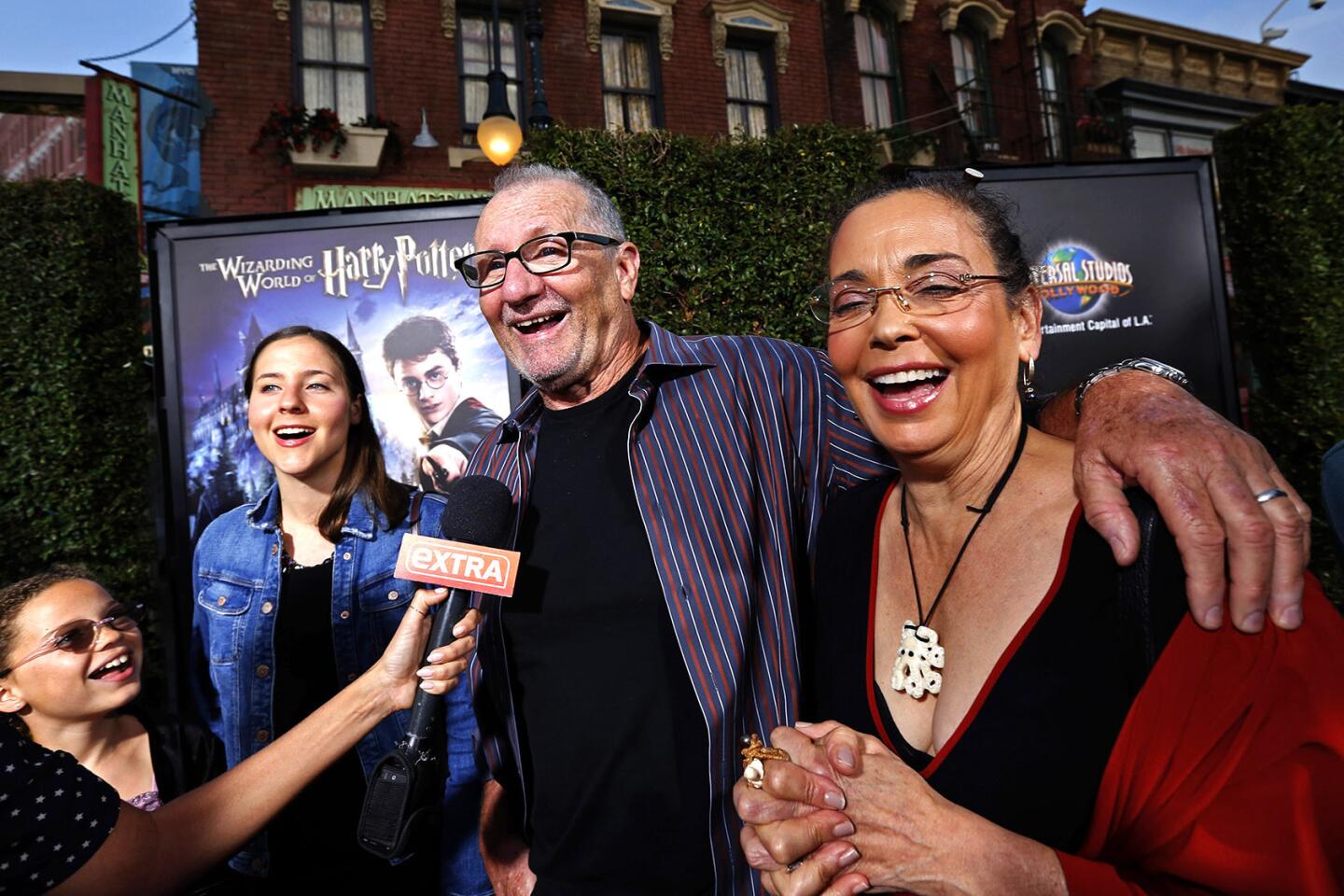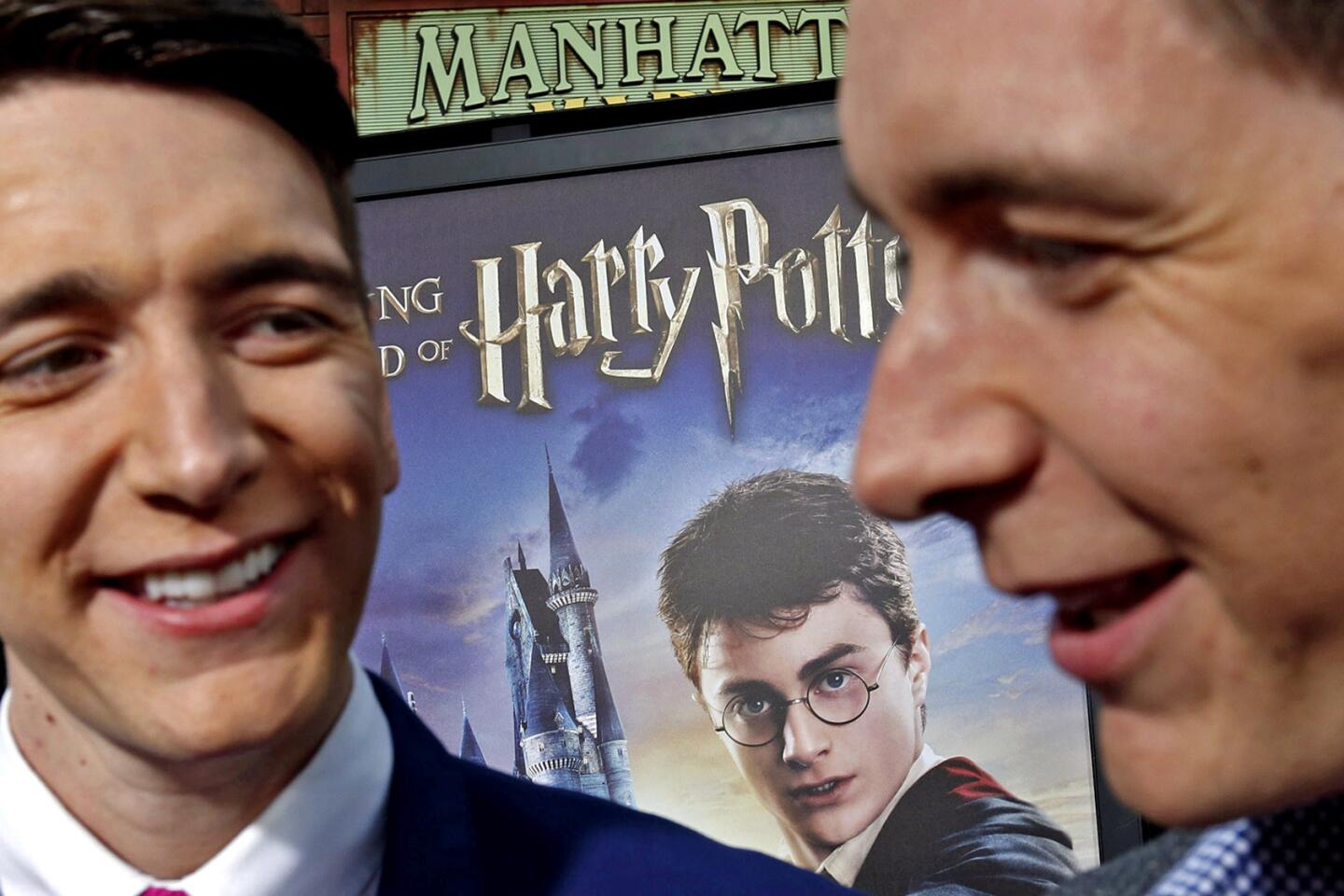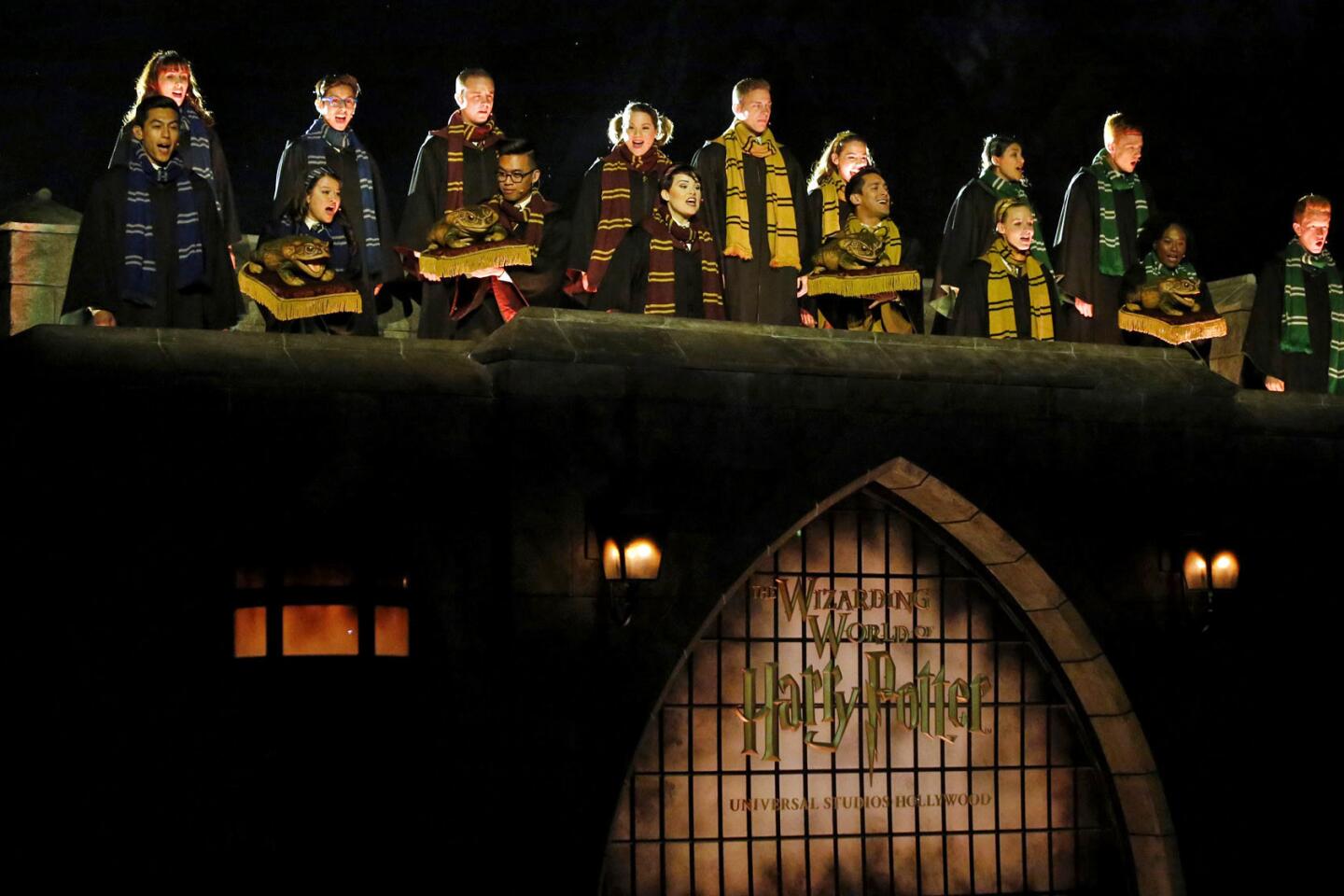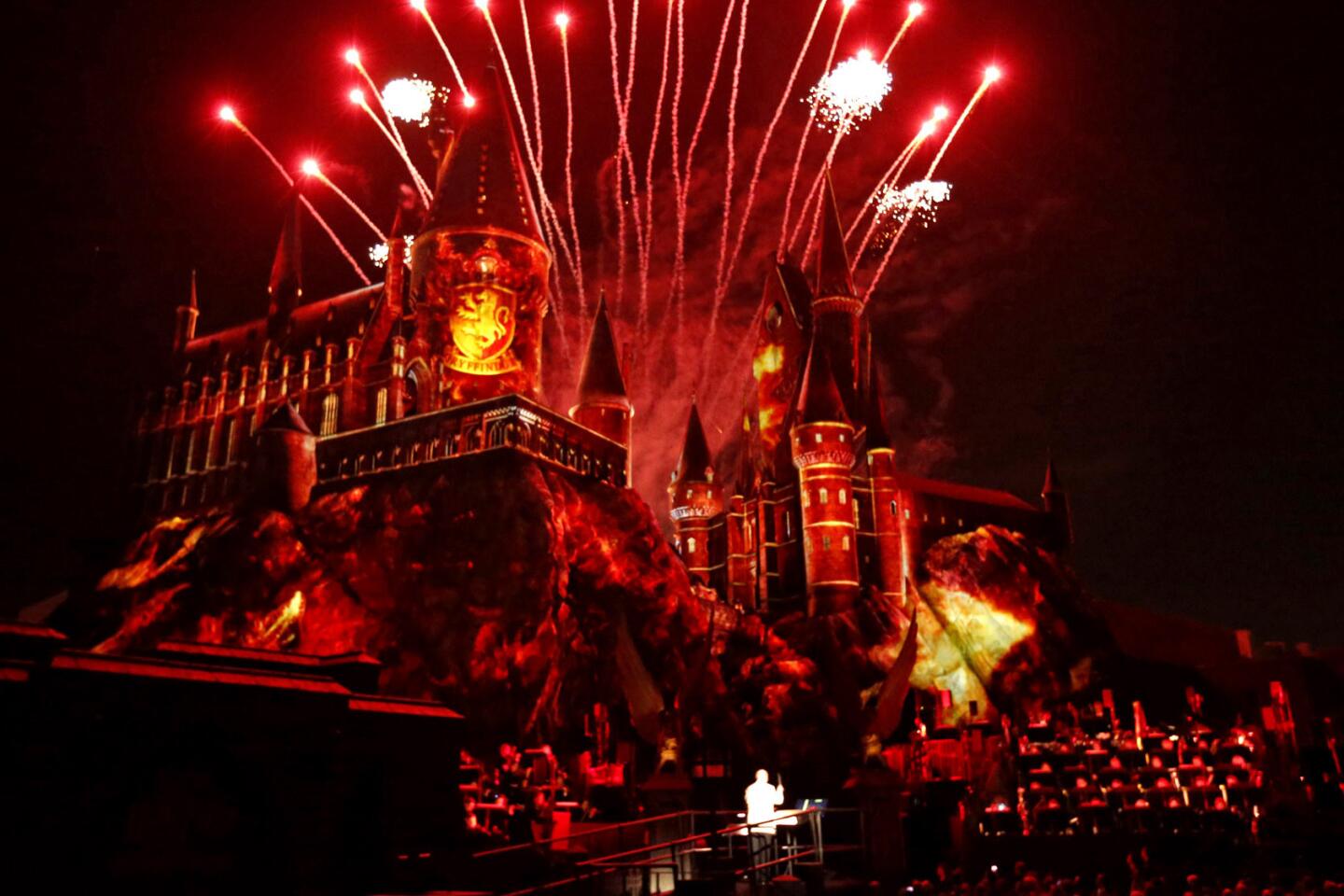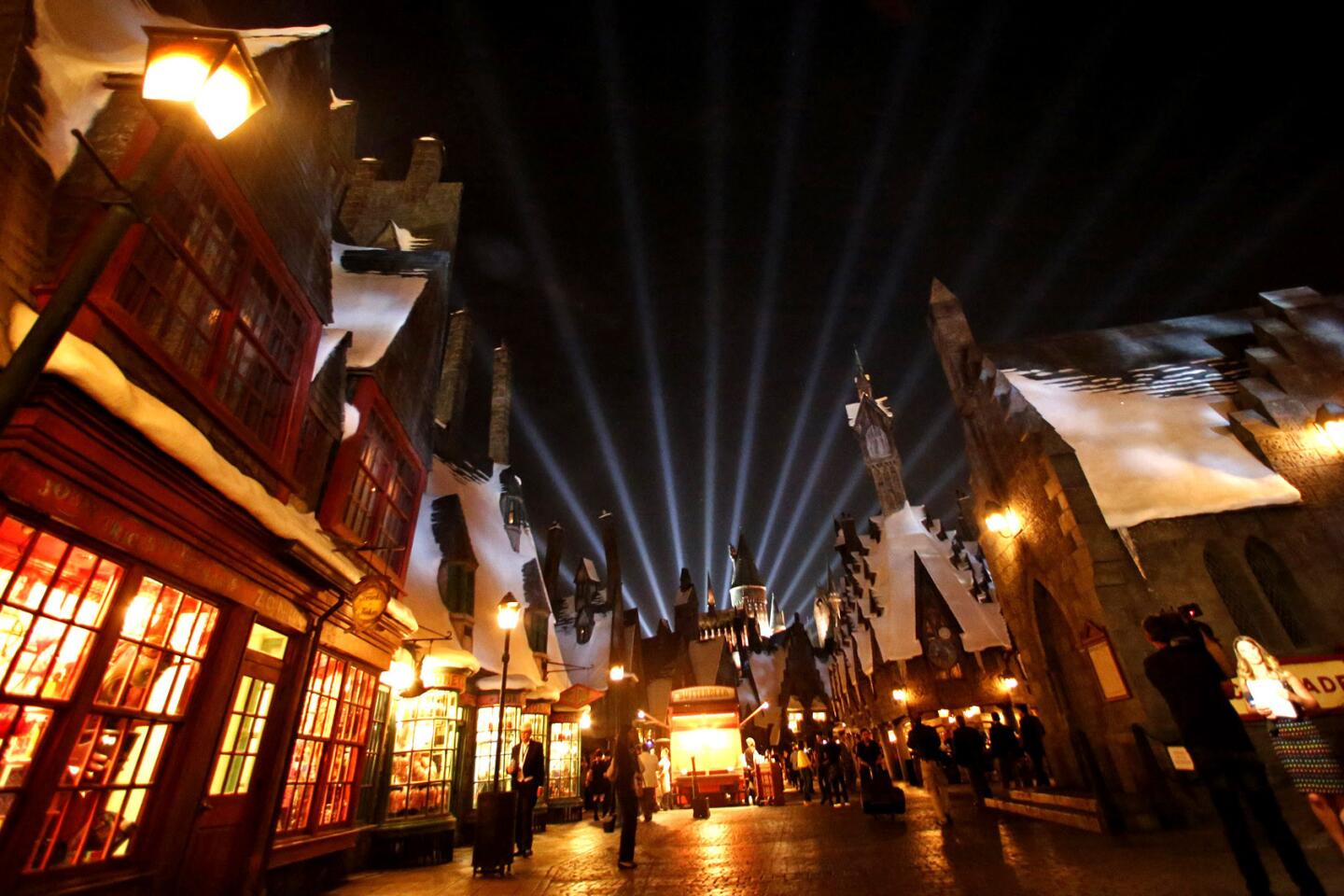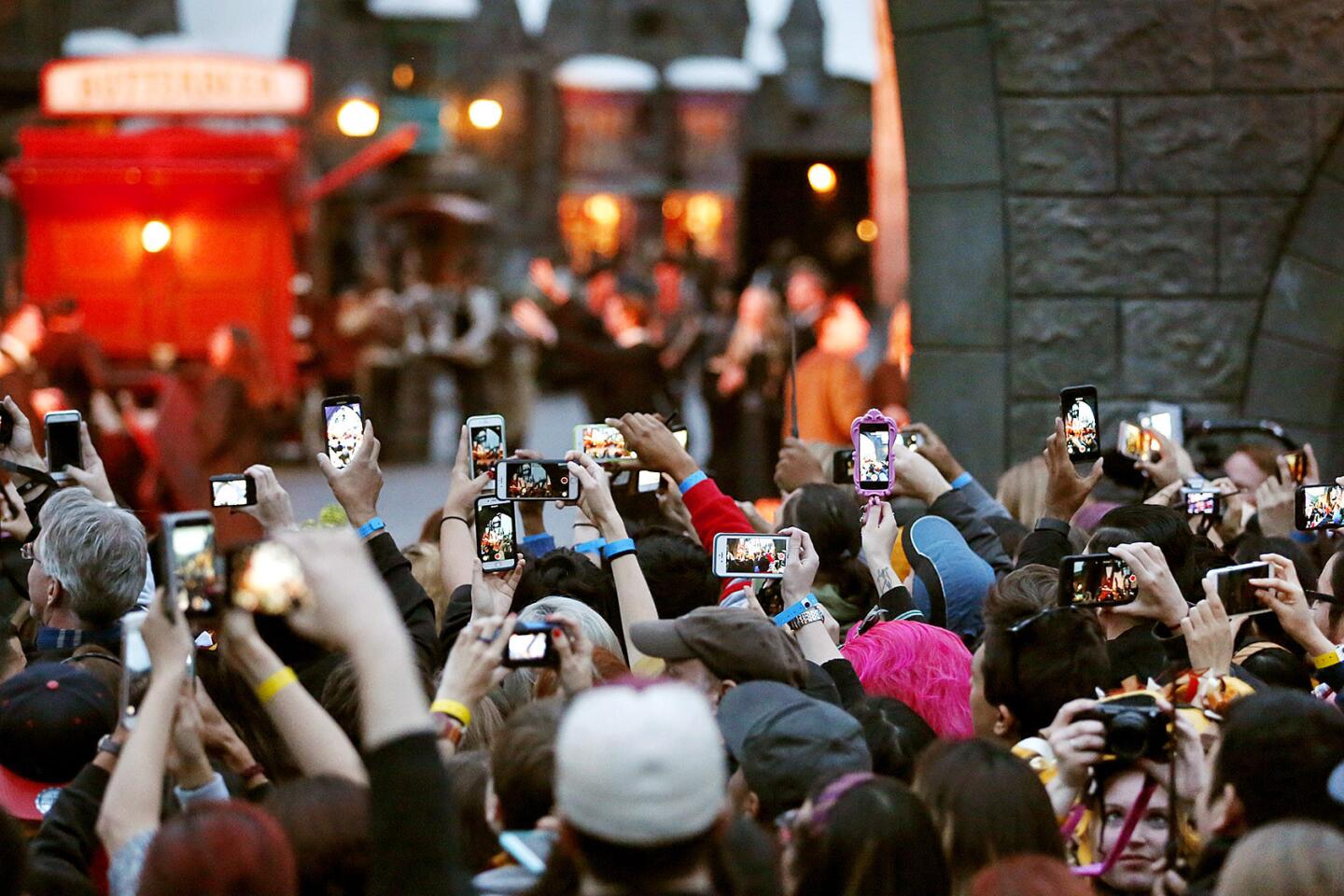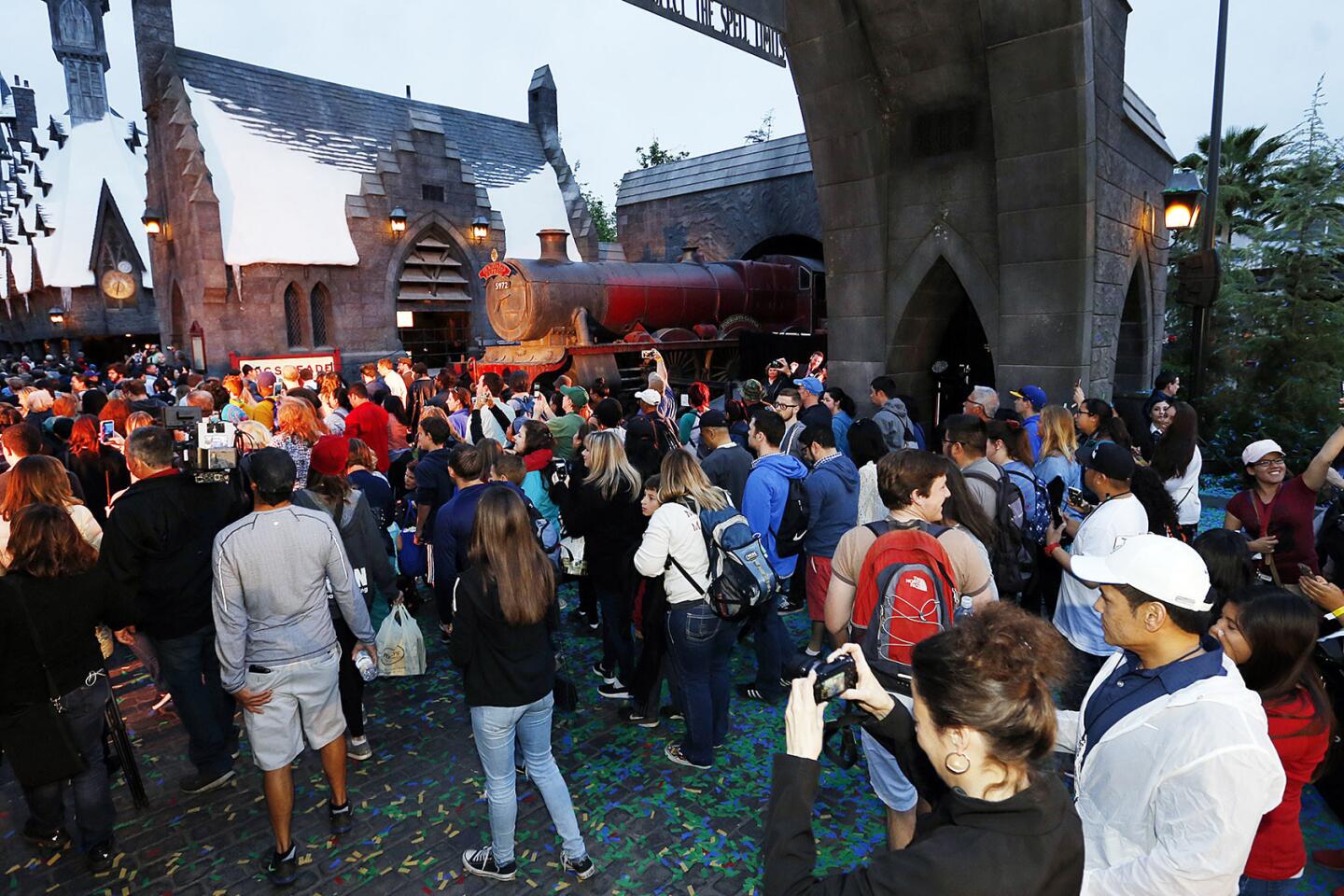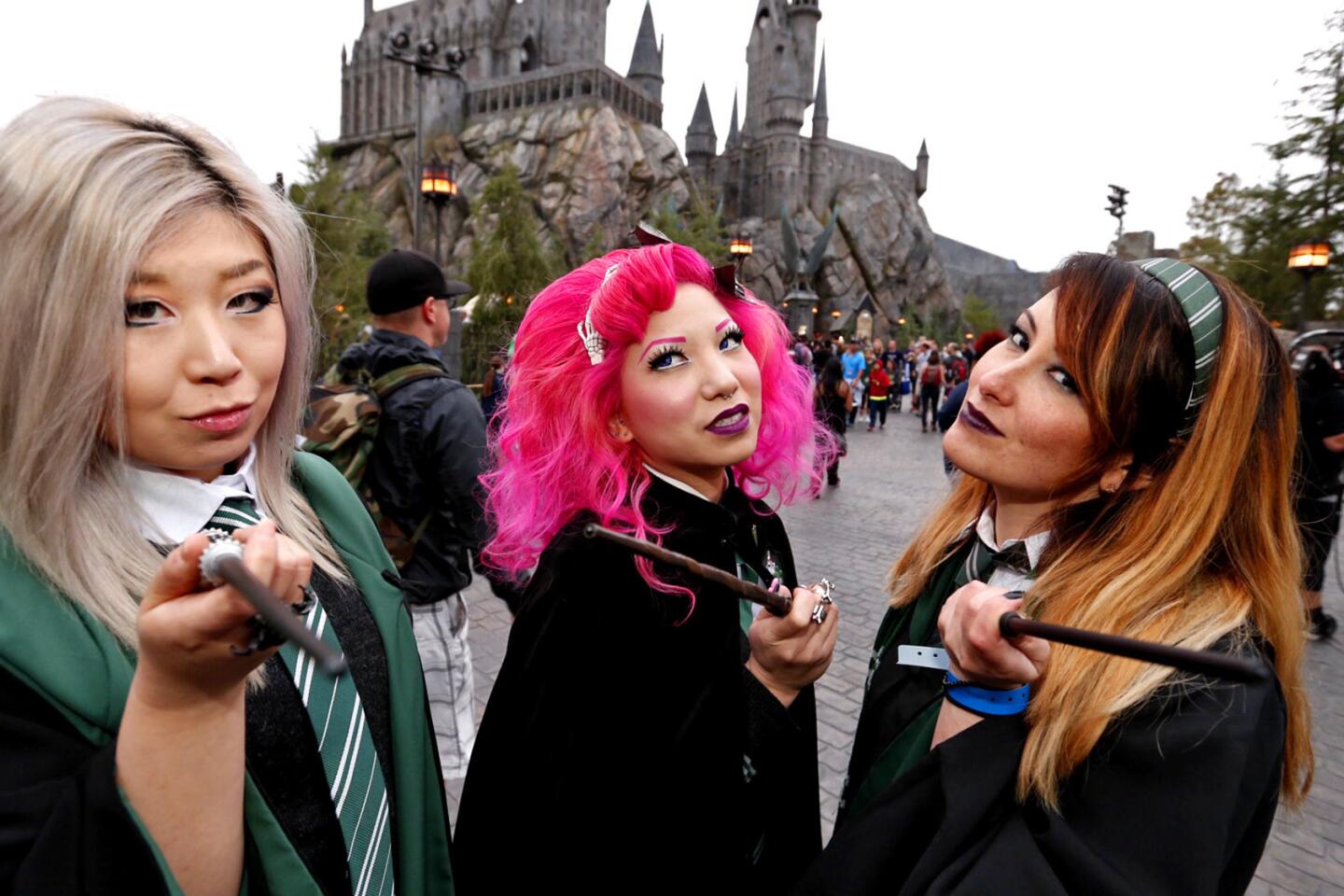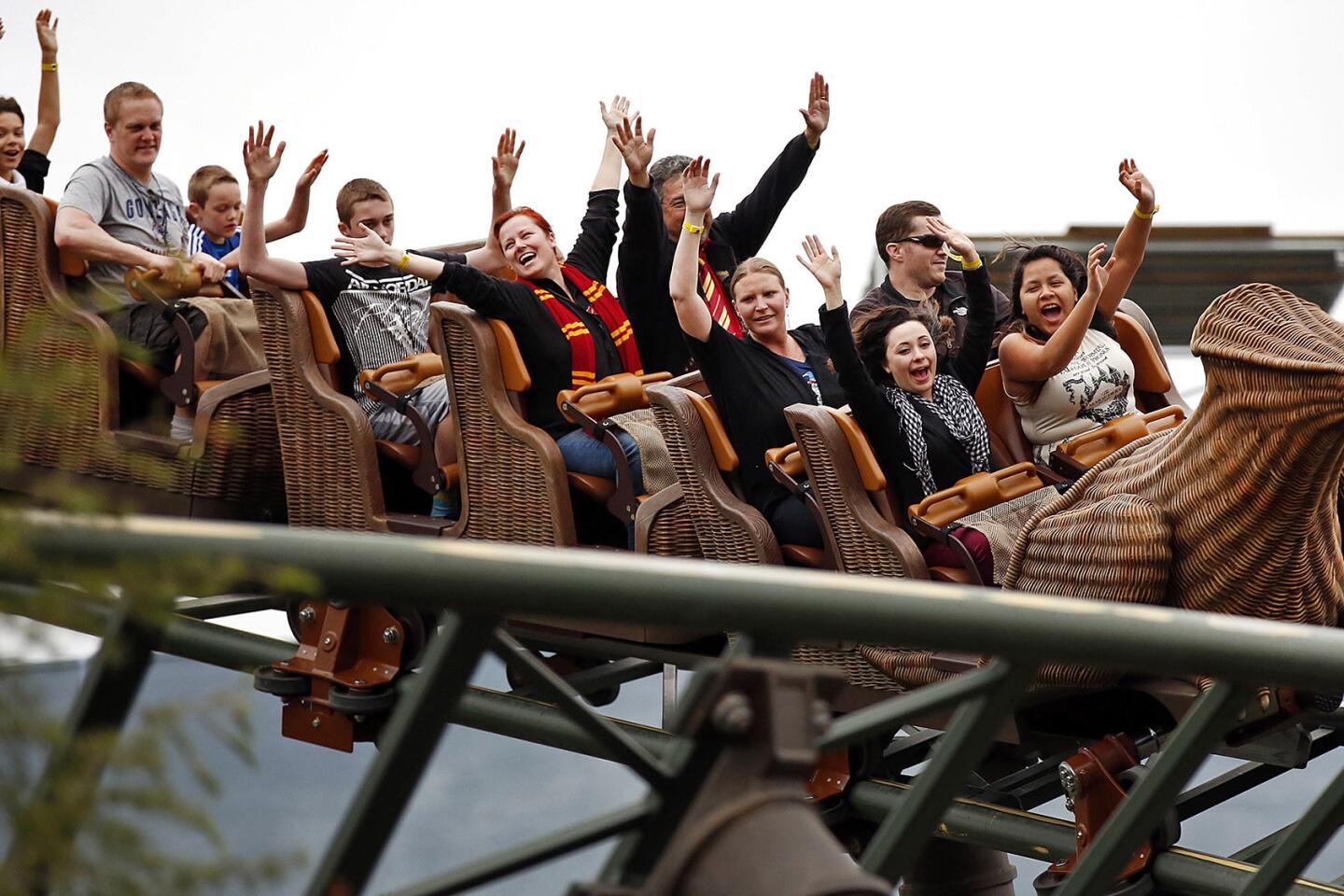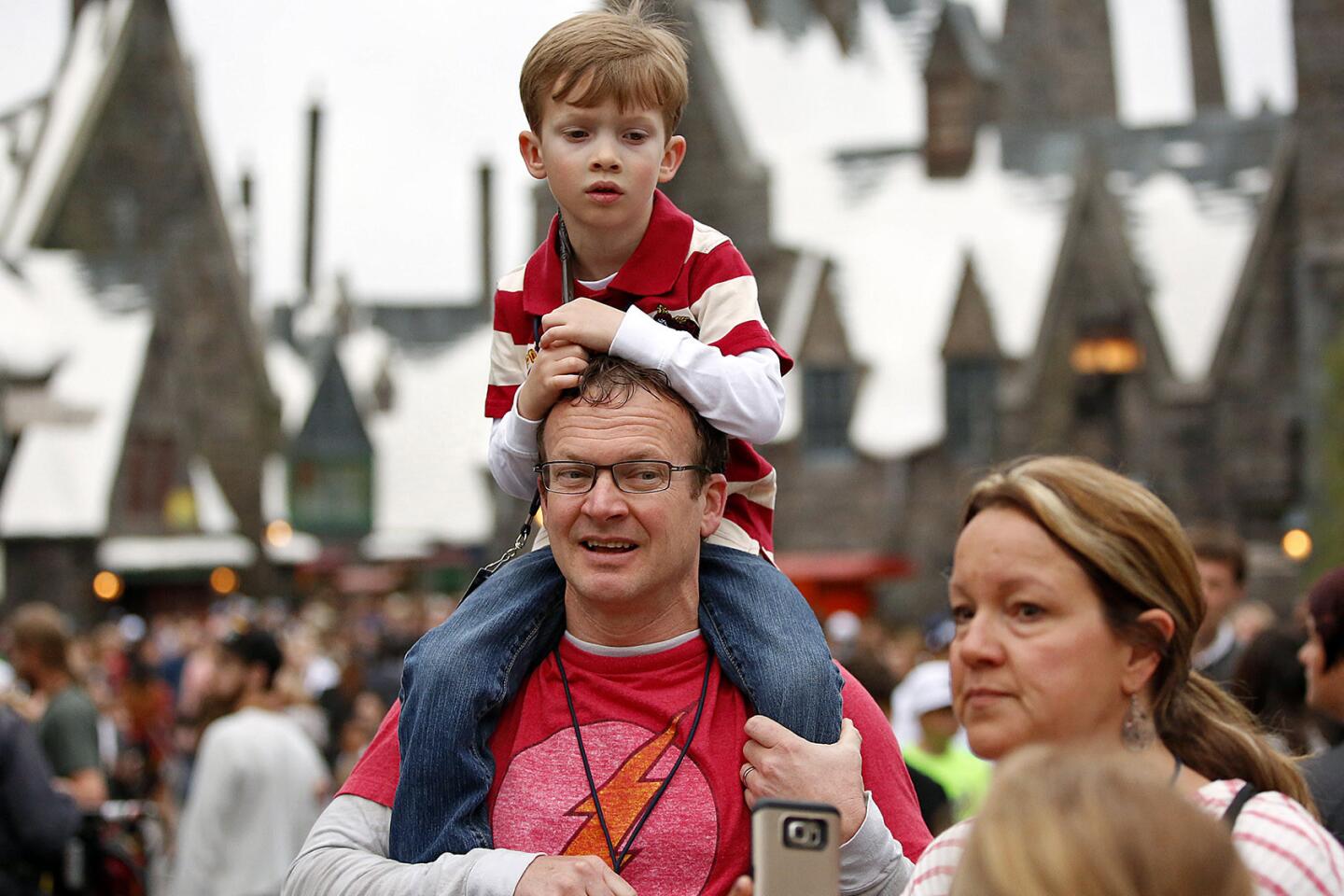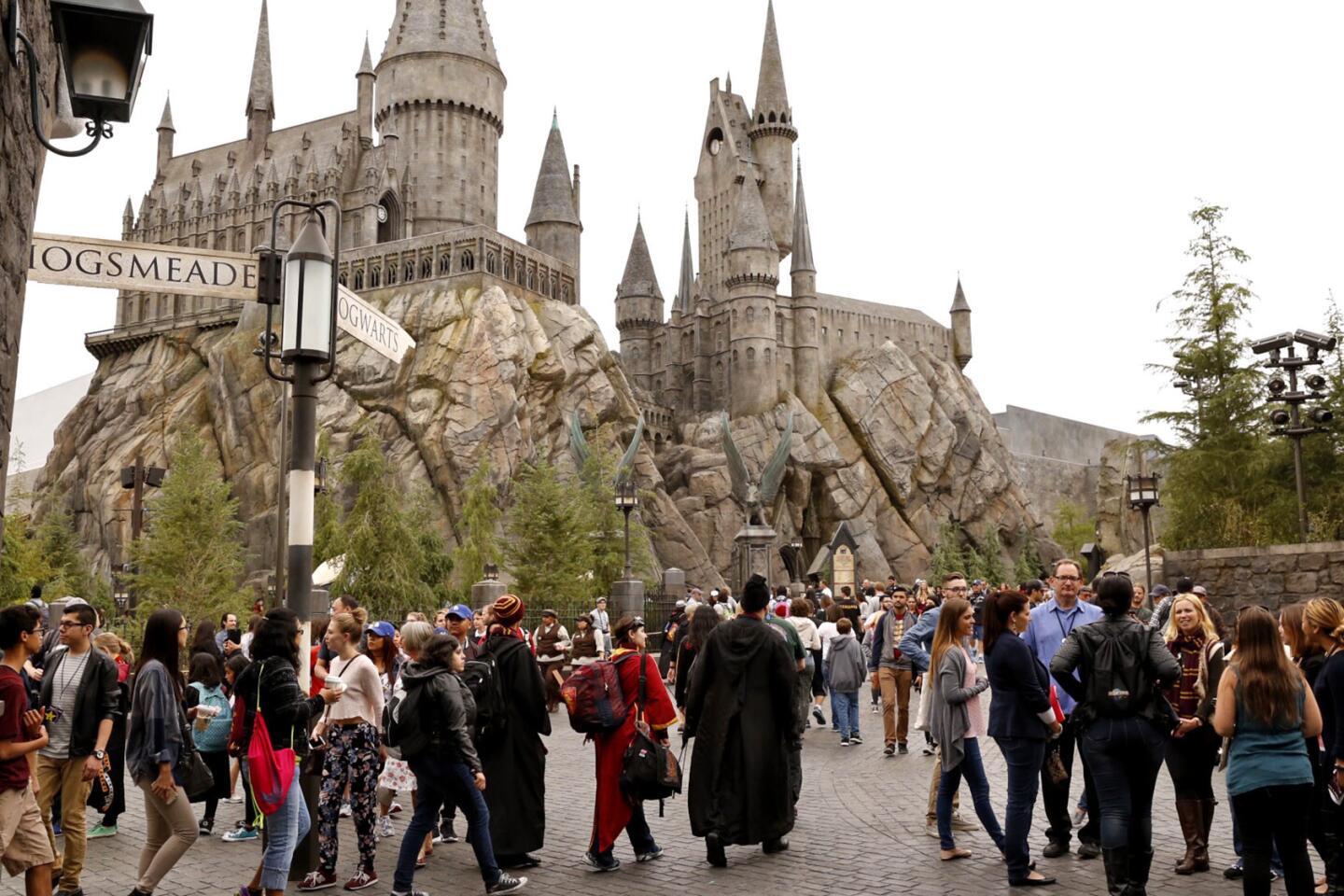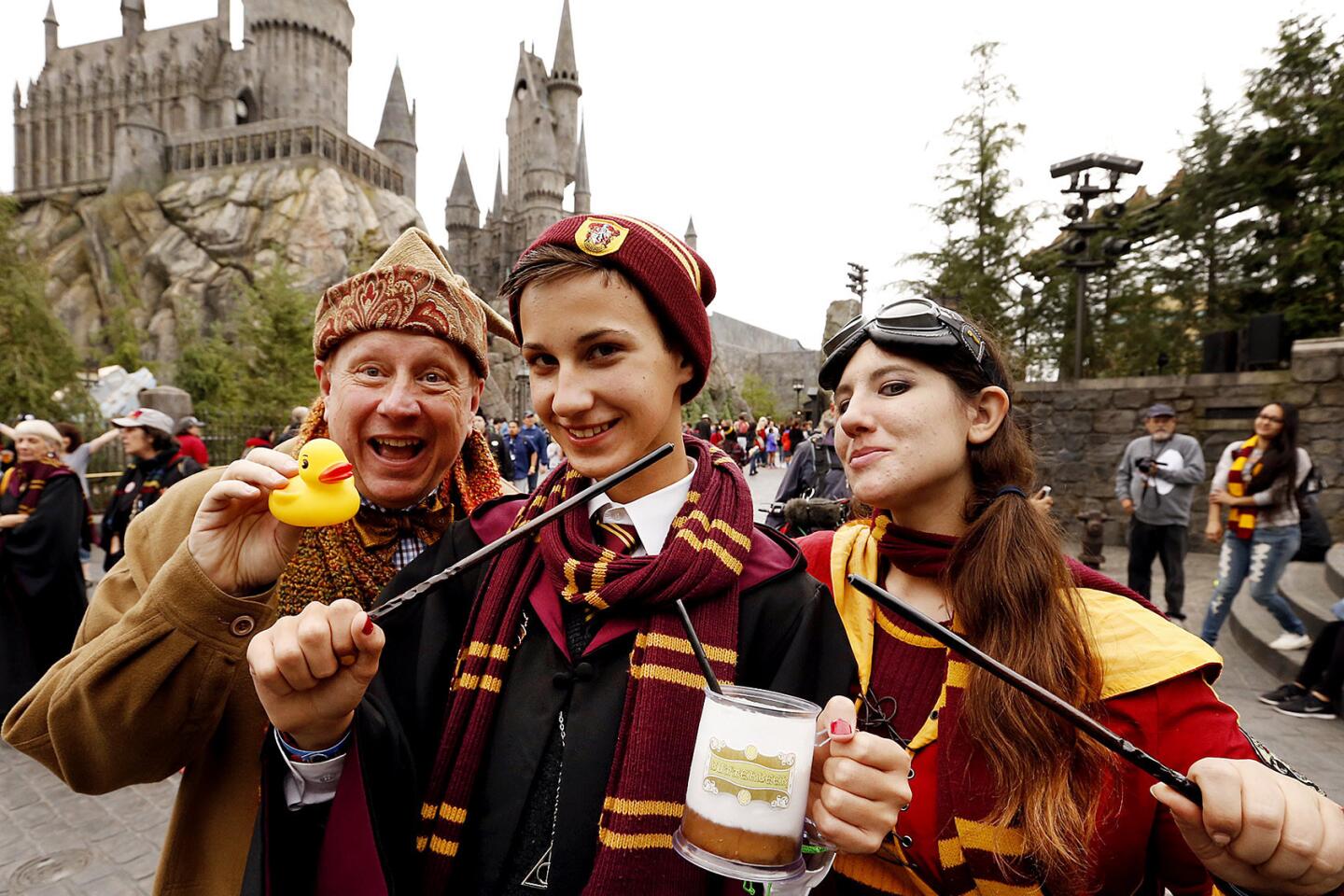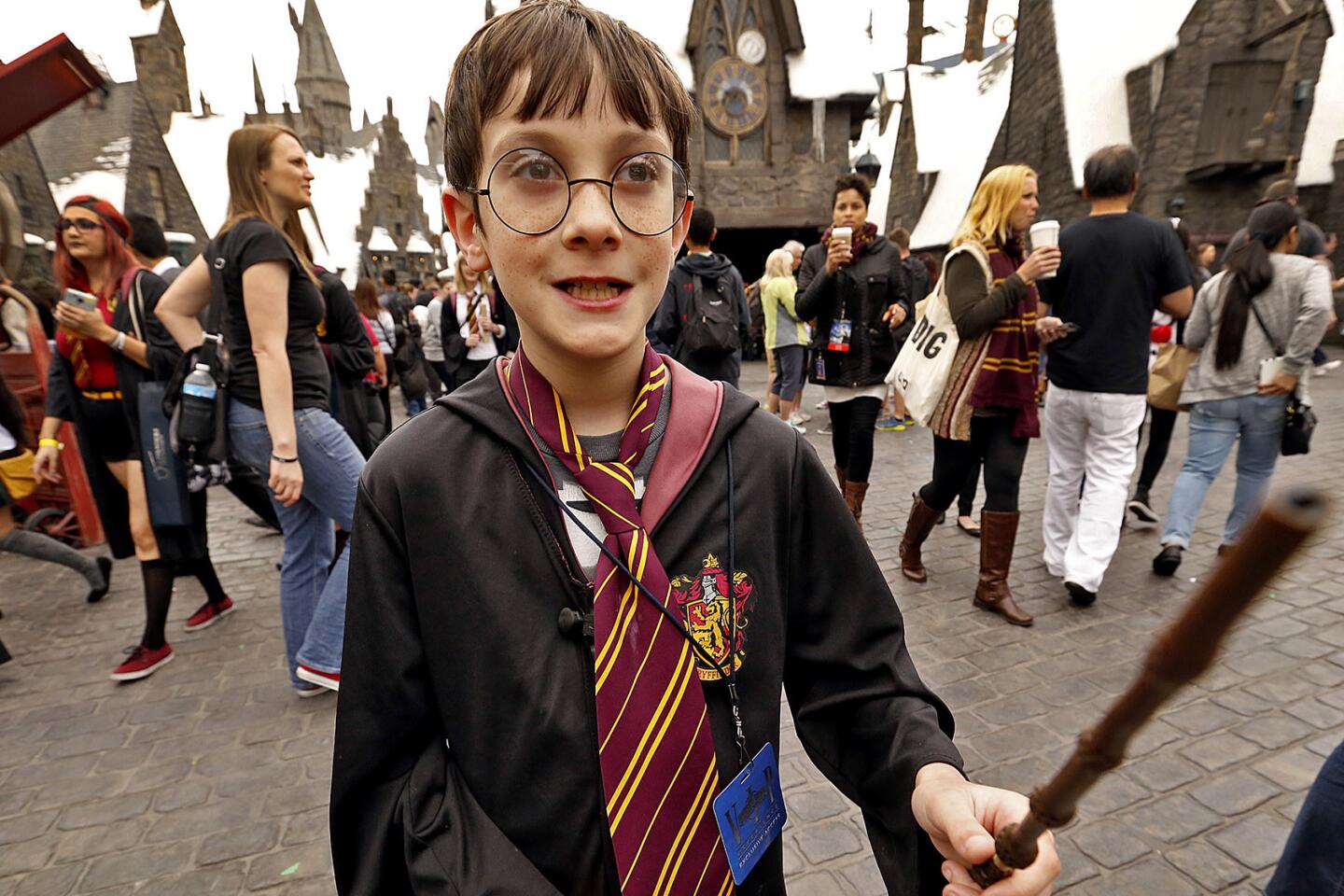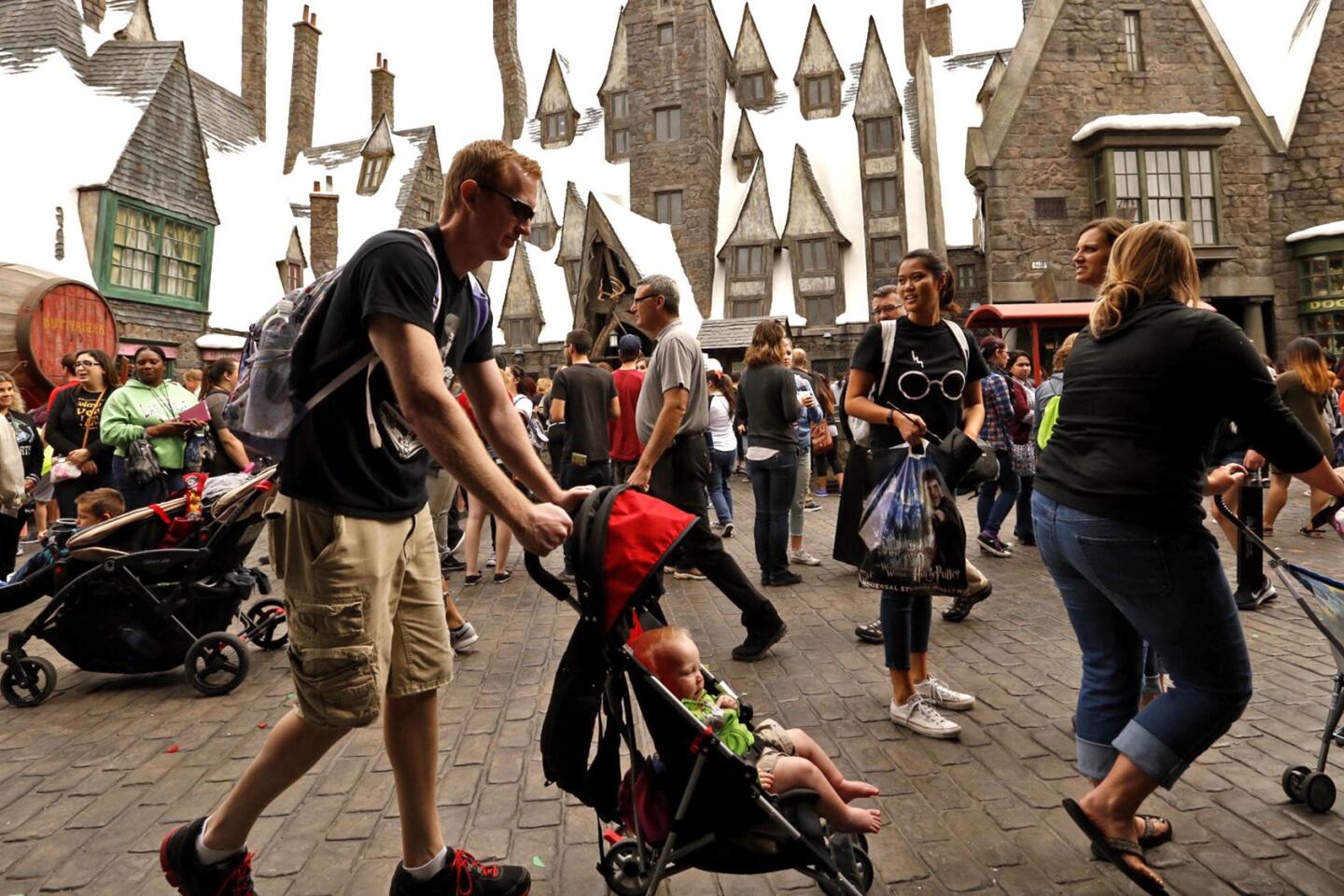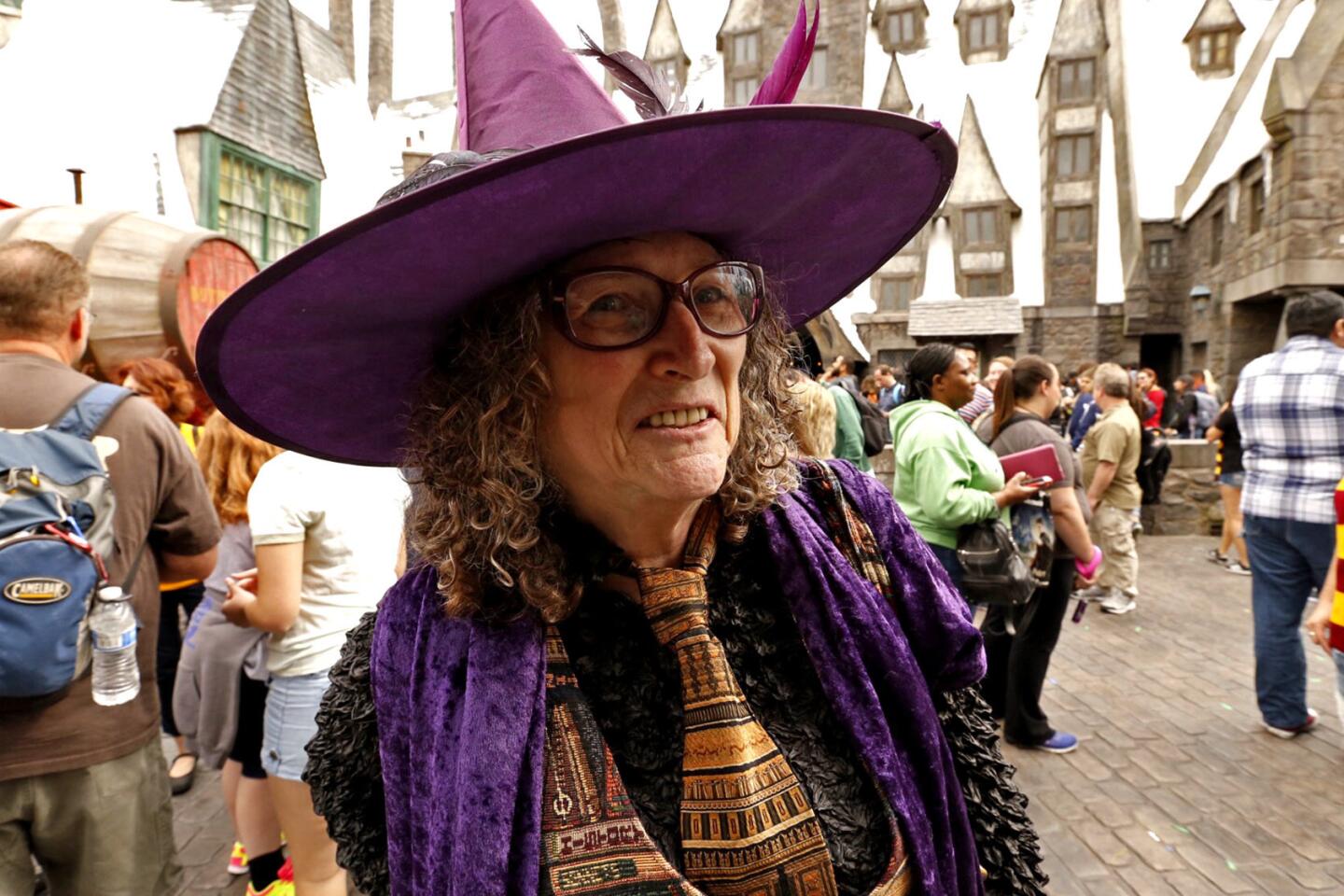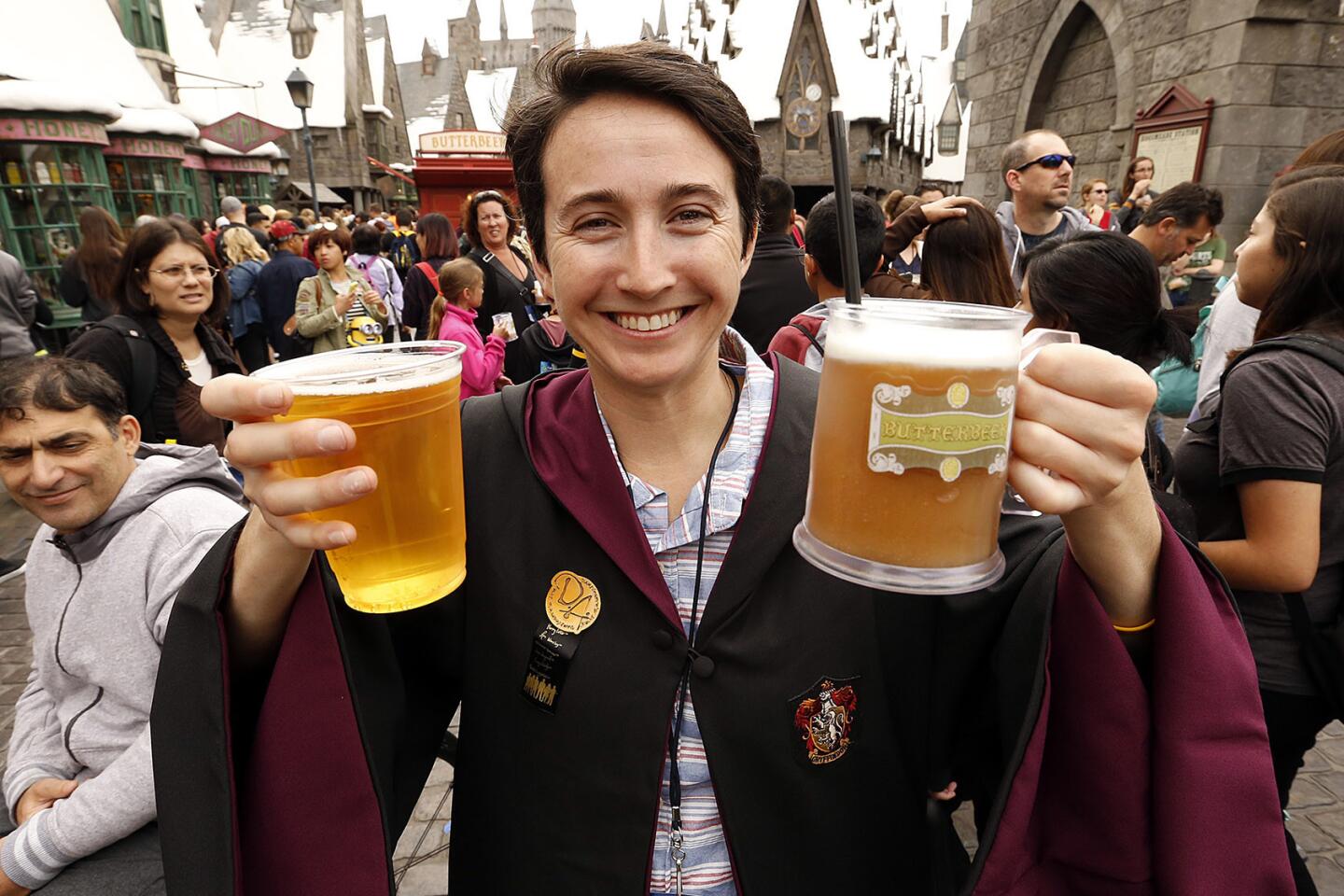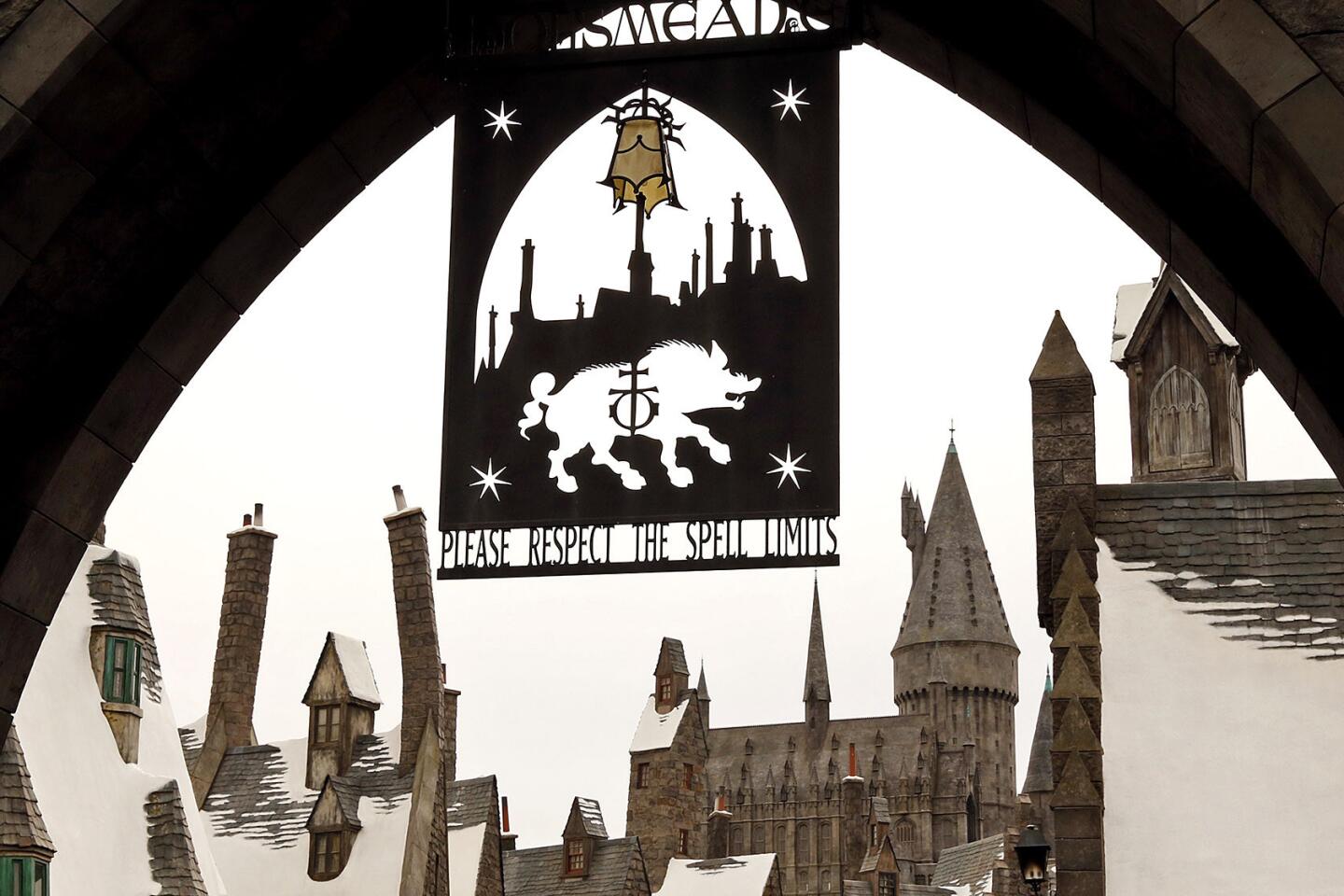Big investments in Potter world and other attractions will pay off for the Southland economy
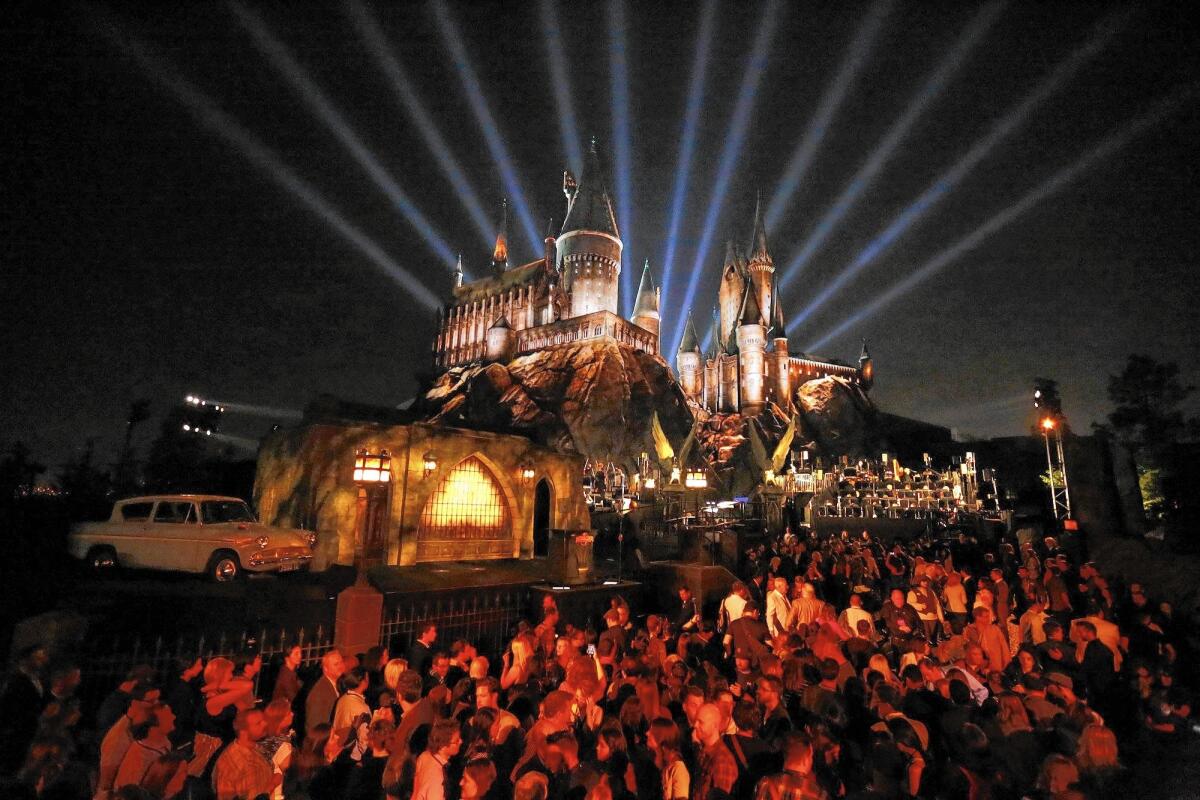
Lights shine behind Hogwarts Castle at Universal Studios Hollywood’s new Wizarding World of Harry Potter attraction.
- Share via
When the $500-million Wizarding World of Harry Potter attraction opened last week at Universal Studios Hollywood, thousands of parkgoers were already lined up at the park entrance in the predawn darkness, forgoing sleep, warmth and comfort to be part of the Potterfest.
Inside, the queues to buy a $6.50 cup of frozen butter beer intertwined with the lines to purchase a $40 replica wand. Visitors who wanted to jump on the 3-D ride had to stand in line for as long as three hours.
“We got ready in the dark and had cold showers to get here for the opening,” said Jody Maiden, who, along with her 12-year-old daughter Reina, had spent $600 on souvenirs by 8:30 a.m.
The new Harry Potter attraction is off to a smashing start, but it is only one of several new big-ticket expansions that are expected to boost Southern California’s $44-billion tourism industry.
From Disneyland in Anaheim to Legoland California in Carlsbad, theme parks and tourist attractions have launched multimillion-dollar expansion and renovation projects over the last year. And the $300-million Great Wolf Lodge, a hotel and indoor water park, was opened this year by a Wisconsin resort operator with help from $47 million in redevelopment funds from the city of Garden Grove.
But the effect on the local economy is mixed.
Southern California theme parks have broken records on spending and attendance in the last year, but most of the jobs created and supported by theme parks and other tourist attractions are minimum-wage, entry-level positions, such as ride operators, waiters, bartenders and cooks, economists say.
“Lots of these jobs tend to be on the lower-paying end,” said Kimberly Ritter-Martinez, an economist for the Kyser Center for Economic Research at the Los Angeles County Economic Development Corp. “A lot of these jobs are for people just entering the workforce.”
Economists welcome the tourism industry investments, but they say the region’s middle class needs higher-paying jobs in fields such as construction and manufacturing.
“We are pleased to see the growth in these projects, but we have to grow in all sectors of middle-class jobs, and we are not seeing that,” said Robert Lapsley, president of the California Business Roundtable, an organization of the state’s top business executives.
Still, there are benefits to the investments at theme parks.
For example, the 200-foot-tall Hogwarts castle at the new Harry Potter attraction created high-paying design and construction jobs, even though such positions were temporary.
Another positive of the tourism growth, Ritter-Martinez said, is that theme park attractions must be freshened up on a regular basis to promote repeat visits.
“To keep people returning, they have to keep updating and adding new experiences,” she said.
Theme parks’ spending spills over into related industries, such as hotels and restaurants.
“It’s a lot more than just low-income jobs,” Roy Weinstein, an economist and president of Los Angeles-based Micronomics Inc., said of theme park projects. “It’s restaurants and hotels. It’s big businesses as well as Uber and taxis and all of the rest of it.”
Anaheim is a good example.
The city’s convention center and the Disneyland Resort, which takes up 4% of Anaheim’s total acreage, together generate nearly half of the city’s annual $286-million general fund revenue. The resort supports more than 2,600 jobs in businesses outside its two theme parks, such as hotels and restaurants, according to the city.
Those numbers are likely to grow now that Walt Disney Co. has begun construction of what is expected to be the biggest expansion in the history of Disneyland: a new 14-acre land based on the scenes and characters of the blockbuster “Star Wars” franchise.
Disney estimates that the expansion, with a projected price tag of nearly
$1 billion, will boost resort staffing 5% to 30,400 employees. A completion date has not been announced for the project, which will replace a special events stage, a petting zoo and a restaurant, and will change the alignment of the venerable Disneyland Railroad.
“Our substantial investment in a ‘Star Wars’-themed land means thousands of construction jobs and new positions at the resort and beyond, as well as economic growth that benefits the entire community,” Disneyland spokeswoman Suzi Brown said.
Entry-level theme park jobs often lead to higher-paying careers, industry experts say.
James Leonard, 28, works at Disneyland’s new Launch Bay attraction, where park visitors meet and take photos with “Star Wars” characters, including Darth Vader.
But Leonard is also a part-time student, studying computer programming with the hope of someday developing attractions at Disneyland. “I love my time with the company and would definitely like to stay,” he said.
The shoulder-to-shoulder crowds at theme parks such as Disneyland indicate that such investments are paying off.
“It tells me that they are very optimistic and attendance numbers continue to be strong,” Ritter-Martinez said.
At Universal Studios Hollywood, the new Harry Potter attraction replaced the aging Gibson Amphitheatre and features eight retail shops, two new rides, a restaurant and a pub. It is part of a larger $1.6-billion upgrade to the park and surrounding studio facilities that has added 3,000 jobs since 2012.
The renovation includes a new pedestrian bridge, two new parking structures and the widening of two streets.
During a red carpet premiere for the Potter world, Los Angeles Mayor Eric Garcetti said he has set a goal of drawing 50 million visitors a year to Los Angles County by 2020. Last year, the county welcomed a record 45.5 million visitors.
“Today, we are taking a giant step toward that goal,” Garcetti said of the Harry Potter project.
In Buena Park, Knott’s Berry Farm has also been on an upgrading campaign.
The park, which started in 1940 as a side attraction to a fried chicken stand, added an interactive 3-D ride last summer and is working this year to restore one of the country’s longest wooden roller coasters, GhostRider.
“What we found in the last couple of years that we’ve been investing in family entertainment is that the guests really respond,” said Jason Soyster, a park spokesman. “The business results show that.”
In Long Beach, the Aquarium of the Pacific has already raised $40 million in donations to pay for a $53-million expansion that will feature an “immersive theater” with a high-definition projection system and 130-foot-long screen that curves 180 degrees to simulate an ocean and coastal environment.
Construction, which is expected to employ up to 50 workers a day, will begin next year with completion in late 2018.
In Carlsbad, Legoland California plans a May 5 opening of its newest attraction, Ninjago, a 1-acre area with a Ninja training space and an interactive ride that lets visitors use hand gestures to shoot virtual fireballs, lightning and ice at bad guys. Park officials won’t divulge the price for the project, but they describe it as the most expensive ride yet at the park.
The attraction will open a year after the park added a 3-acre water park and two years after it added a 250-room hotel.
But Legoland is not done expanding. The park’s parent company has announced plans to build a second 250-room hotel, to open by 2018.
“It keeps the product fresh,” Peter Ronchetti, general manager of Legoland California, said of the upgrades and expansions. “There is always a reason to come back.”
Twitter: @hugomartin
ALSO
How Disney used shell companies to start its Magic Kingdom
Millennials are better than we thought at saving money, studies find
Personal Finance Q&A: Letting car be repossessed will make debt problem worse
More to Read
Inside the business of entertainment
The Wide Shot brings you news, analysis and insights on everything from streaming wars to production — and what it all means for the future.
You may occasionally receive promotional content from the Los Angeles Times.
